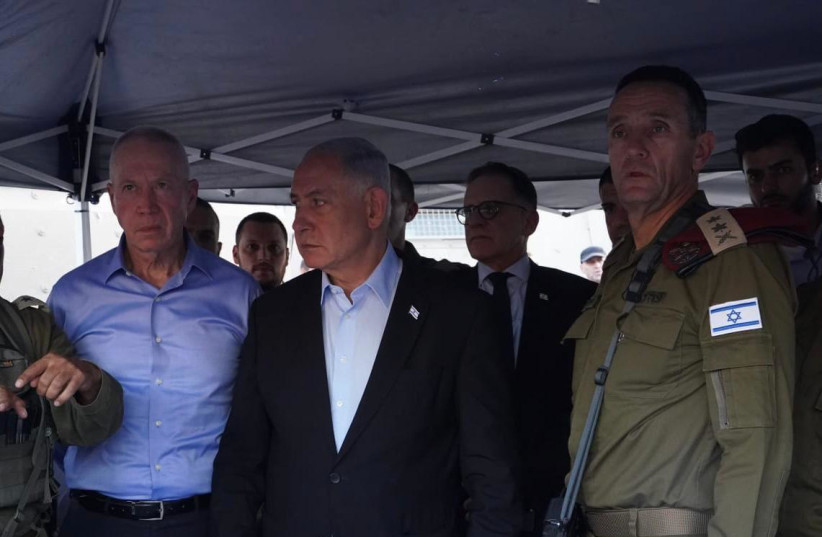Late on Monday, according to the Syrian Observatory for Human Rights, Israeli missiles destroyed arms depots belonging to pro-Iran militias and the Lebanese terrorist group Hezbollah several kilometers from Damascus International Airport.
Israel, as is its custom, had no comment.
Nevertheless, it is clear that in the past decade the IDF has been working with tremendous determination and firepower, and no small amount of success, to prevent Iran from turning Syria into a beachhead against Israel.
As the recent wave of Palestinian terrorism in Judea and Samaria demonstrates, however, Israel is not having the same success in keeping Iran out of the West Bank.
After Palestinian terrorists murdered Batsheva Nigri near Hebron on Monday, Prime Minister Benjamin Netanyahu and Defense Minister Yoav Gallant went to the site of the attack and pointed a finger at Iran.

“We are in the midst of a terrorist onslaught that is encouraged, guided, and funded by Iran and its proxies,” Netanyahu said. “A significant portion of this wave of terrorism came from external guidance.” He said Israel “will use additional means of attack and defense to make the terrorists pay, along with those who send them, near or far.”
The current wave of terror, Gallant said, “is all guided by Iran, which is looking for any way to harm Israeli citizens.” Without providing details, he said Israel “will take additional actions that will ensure the security of Israeli citizens and make those responsible pay a price.”
It does not stretch credulity to hear these words and conclude that part of any new plan to tackle the wave of terror will deal with Iranian assistance to the terrorists: financial, logistic, and otherwise.
In 2018, when he was education minister, Naftali Bennett propounded a theory of how to deal with aggression from Iran, which he termed the “octopus doctrine.”
“The Iranians don’t love dying, but it is very easy for them to send others to die,” he said. “While we’re shedding blood fighting their tentacles, the octopus’s head is lounging in its chair, enjoying itself.” Bennett’s conclusion: it was time for Israel “to aim at the head of the octopus and not its tentacles.”
Iran is definitely helping fund Palestinian terror attacks in the West Bank
Some may argue that Netanyahu and Gallant blame Iran because they are just looking for an easy scapegoat for the terrorism that this government is proving unable to quell.
But one need not take Netanyahu and Gallant’s word for it. Listen to the Palestinians and Iranians themselves.
The Meir Amit Intelligence and Terrorism Information Center regularly monitors Iranian intervention in the Palestinian arena. Here is a tiny morsel of what they have culled over the last two months:
On July 25, Iran’s semi-official news agency Mehr quoted senior Hamas official Moussa Abu Marzouk as praising Iran’s support for the Palestinians and saying Iran is actually fighting alongside “the resistance in Palestine” through its generous support.
An editorial published by the Iranian Tasnim News Agency on July 10, after Israel’s operation in Jenin, said the danger the West Bank posed for Israel was not limited to Jenin, and that the successful arming of the West Bank would sink the “leaking ship of Israel.”
On July 2, Ziyad al-Nakhalah, the secretary-general of the Palestinian Islamic Jihad, said in an interview with an Iranian government newspaper that Iran supported the Palestinians in many areas and that the most important assistance was in the “military-security domain.”
In recent months, Iran has hosted senior Hamas and Palestinian Islamic Jihad figures in Tehran on several occasions for talks that obviously were not centered on the weather.
According to Netanyahu and Gallant, Iranian fingerprints are on the recent uptick of attacks. If Israel’s long arm can prevent Iranian entrenchment in Syria, it should be able to curb its activities closer to home in Judea and Samaria as well.
Palestinian terrorism will persist without Iranian financial, moral, and material aid. But the terrorists might not exhibit the same level of boldness demonstrated in recent weeks without the inflow of support from Tehran. If Netanyahu and Gallant are indeed aware of Iranian engagement in the current wave of murderous terror, it is time to move beyond mere threatening statements and order decisive action to put an end to that involvement.
